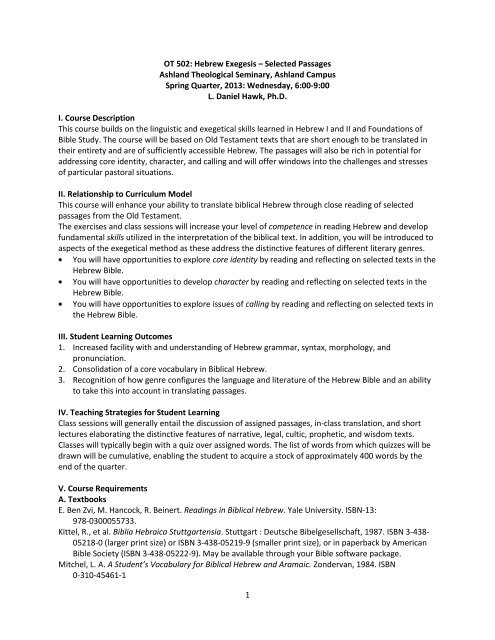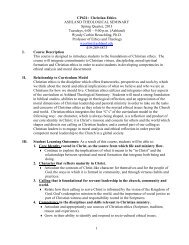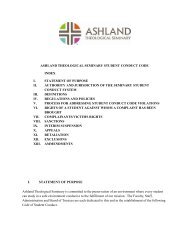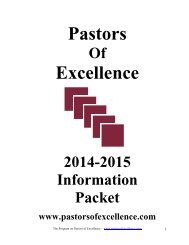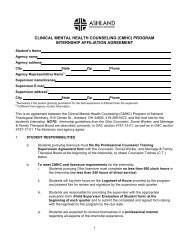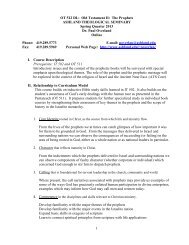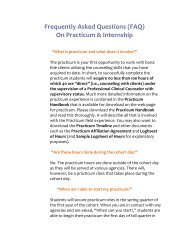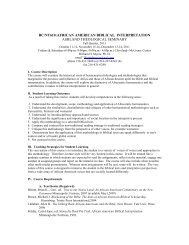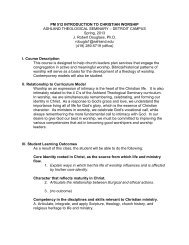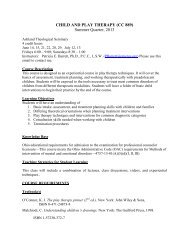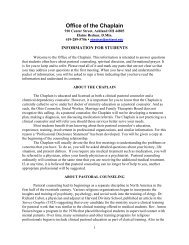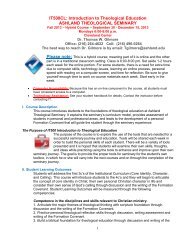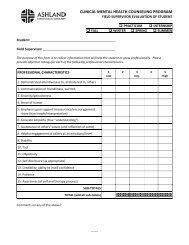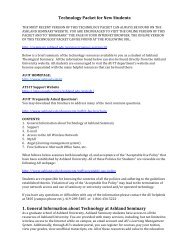1 OT 502: Hebrew Exegesis â Selected Passages Ashland ...
1 OT 502: Hebrew Exegesis â Selected Passages Ashland ...
1 OT 502: Hebrew Exegesis â Selected Passages Ashland ...
Create successful ePaper yourself
Turn your PDF publications into a flip-book with our unique Google optimized e-Paper software.
<strong>OT</strong> <strong>502</strong>: <strong>Hebrew</strong> <strong>Exegesis</strong> – <strong>Selected</strong> <strong>Passages</strong><strong>Ashland</strong> Theological Seminary, <strong>Ashland</strong> CampusSpring Quarter, 2013: Wednesday, 6:00-9:00L. Daniel Hawk, Ph.D.I. Course DescriptionThis course builds on the linguistic and exegetical skills learned in <strong>Hebrew</strong> I and II and Foundations ofBible Study. The course will be based on Old Testament texts that are short enough to be translated intheir entirety and are of sufficiently accessible <strong>Hebrew</strong>. The passages will also be rich in potential foraddressing core identity, character, and calling and will offer windows into the challenges and stressesof particular pastoral situations.II. Relationship to Curriculum ModelThis course will enhance your ability to translate biblical <strong>Hebrew</strong> through close reading of selectedpassages from the Old Testament.The exercises and class sessions will increase your level of competence in reading <strong>Hebrew</strong> and developfundamental skills utilized in the interpretation of the biblical text. In addition, you will be introduced toaspects of the exegetical method as these address the distinctive features of different literary genres.You will have opportunities to explore core identity by reading and reflecting on selected texts in the<strong>Hebrew</strong> Bible.You will have opportunities to develop character by reading and reflecting on selected texts in the<strong>Hebrew</strong> Bible.You will have opportunities to explore issues of calling by reading and reflecting on selected texts inthe <strong>Hebrew</strong> Bible.III. Student Learning Outcomes1. Increased facility with and understanding of <strong>Hebrew</strong> grammar, syntax, morphology, andpronunciation.2. Consolidation of a core vocabulary in Biblical <strong>Hebrew</strong>.3. Recognition of how genre configures the language and literature of the <strong>Hebrew</strong> Bible and an abilityto take this into account in translating passages.IV. Teaching Strategies for Student LearningClass sessions will generally entail the discussion of assigned passages, in-class translation, and shortlectures elaborating the distinctive features of narrative, legal, cultic, prophetic, and wisdom texts.Classes will typically begin with a quiz over assigned words. The list of words from which quizzes will bedrawn will be cumulative, enabling the student to acquire a stock of approximately 400 words by theend of the quarter.V. Course RequirementsA. TextbooksE. Ben Zvi, M. Hancock, R. Beinert. Readings in Biblical <strong>Hebrew</strong>. Yale University. ISBN‐13:978‐0300055733.Kittel, R., et al. Biblia Hebraica Stuttgartensia. Stuttgart : Deutsche Bibelgesellschaft, 1987. ISBN 3-438-05218-0 (larger print size) or ISBN 3-438-05219-9 (smaller print size), or in paperback by AmericanBible Society (ISBN 3-438-05222-9). May be available through your Bible software package.Mitchel, L. A. A Student’s Vocabulary for Biblical <strong>Hebrew</strong> and Aramaic. Zondervan, 1984. ISBN0‐310‐45461‐11
RecommendedBrown, F., et al. The Brown-Driver-Briggs-Gezenius <strong>Hebrew</strong> and English Lexicon. Peabody, MA:Hendrickson, 1995. ISBN 1-56563-206-0. (Note: Logos Bible Software Original Languages Librarycontains this, full text.)R. Williams. <strong>Hebrew</strong> Syntax. 3rd ed. University of Toronto. ISBN 978-0-8020-9492-2B. AttendanceIn conformity with the Student Handbook, attendance at all class sessions is expected. Any studentmissing more than three hours will be given an additional assignment. Absence from more than sixhours of class time will result in loss of credit for the course.About Incompletes and ExtensionsAn Incomplete or Extension will be granted only in the case of an unforeseen disruption in your personalor professional life. No extensions will be granted after May 30 unless an emergency arises after thatdate.C. Assignments/Assessment of Student Learning1. Each class will focus on a translation passage drawn from Readings in Biblical <strong>Hebrew</strong>. Each studentwill come to class with an original translation of the passage and a completed parsing chart. Studentswill correct hard copies in class and submit the copies at the end of each class. Outcome 12. Each class will begin with a quiz on a cumulative list of assigned words (comprising approximately 40new words a week). Outcome 23. A word study will be assigned and completed at some point midway in the quarter. Outcomes 1, 34. A take-home examination on a selected passage will be administered at the end of the quarter.Outcomes 1,35. Students will be prepared to read aloud a selected portion of the assigned <strong>Hebrew</strong> passage whencalled upon during class. Outcome 1D. Calculation of GradeWeekly assignments 33%Word study 10%Vocabulary quizzes 15%Take-home exam 32%Oral reading fluency 10%VI. Course ScheduleWeek Date(s) Lecture/Topic Assignments1 April 3 Narrative2 April 10 Narrative 1 Samuel 1: Verses TBDVocabulary - Section 1: A & B3 April 17 Narrative 1 Samuel 1: Verses TBDVocabulary - Section 1: C & D4 April 24 Prophecy Ezekiel 37:1-7Exodus 21:28-36Vocabulary - Section 2: A & B2
5 May 1 Prophecy Ezekiel 37:8-14Vocabulary - Section 2: C & DWord Study6 May 8 Prophecy Isaiah 49:1-6Vocabulary - Section 2: E7 May 15 Wisdom Proverbs 10:1, et al.Vocabulary - Section 3: A & B8 May 22 Law Exodus 21:28-36Vocabulary - Section 3: C & D9 May 30 Priestly Torah Leviticus 5:20-26Exodus 21:28-36Vocabulary - Section 3: E & F10 June 5 Psalms Examination AssignmentVocabulary – Section3: GVII. Seminary GuidelinesA. ATS Academic Integrity Policy<strong>Ashland</strong> Theological Seminary seeks to model servant leadership derived from biblical standards ofhonesty and integrity. We desire to encourage, develop, and sustain men and women of character whowill exemplify these biblical qualities in their ministry to the church and the world. As members of theseminary community, students are expected to hold themselves to the highest standards of academic,personal, and social integrity. All students, therefore, are expected to abide by the academic integritystandards outlined in the Student Handbook.B. Writing AssistanceIf you need assistance with writing projects for your coursework, contact the ATS WritingCenter. The center provides free sessions with a peer consultant who can help you with allof your concerns about academic writing. Contact the center if you have a question abouthow to complete your assignment, if you have documentation questions, or if you wouldlike to have your paper evaluated for areas needing improvement. The ATS Writing Centercan be reached at 419‐289‐5162 or by e‐mail at atswc@ashland.edu.C. Students with DisabilitiesFor students who have specific physical, psychiatric or learning disabilities and require accommodations,please let the professor know early in the quarter (preferably the first week) so that your learning needscan be appropriately met. In order to receive accommodations, documentation concerning yourdisability must be on file with Classroom Support Services, 105 Amstutz Hall, <strong>Ashland</strong> University,419‐289‐5953. Please contact them with any questions you may have.3
D. ATS Grading ScaleGrade Percent Grade Points DescriptionA 97-100 4.0 Superior achievement of course objectives, diligence and originality,high degree of freedom from error, outstanding evidence of ability toutilize course knowledge, initiative expressed in preparing andcompleting assignments, positive contributions verbalized in class.A - 92-96 3.7B + 89-91 3.3B 86-88 3.0 Good work submitted, commendable achievement of courseobjectives, some aspects of the course met with excellence,substantial evidence of ability to utilize course material, positivecontributions verbalized in class, consistency and thoroughness ofwork completed.B - 83-85 2.7C + 80-82 2.3C 77-79 2.0 Acceptable work completed, satisfactory achievement of courseobjectives, demonstrating at least some ability to utilize courseknowledge, satisfactory class contributionC - 74-76 1.7D + 71-73 1.3D 68-70 1.0 Passing but minimal work, marginal achievement of course objectives,poor performance in comprehension of work submitted, inadequateclass contributions.D - 65-67 0.7F Below 65 0 Unacceptable work resulting in failure to receive class credit,inadequacy of work submitted or of performance and attendance inclass.4


